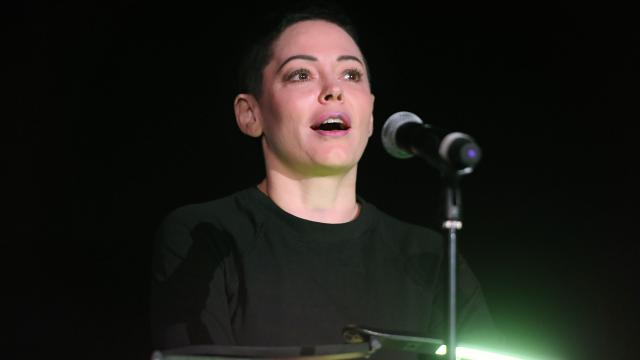Photo: Getty
On Wednesday night, Rose McGowan’s Twitter account was suspended. McGowan had used the platform as a soapbox to call out sexual harassment in Hollywood, posting a series of tweets about Harvey Weinstein as well as telling Ben Affleck to “fuck off.” Twitter belatedly offered an explanation for the suspension, noting that “[McGowan’s] account was temporarily locked because one of her Tweets included a private phone number.” But in response, a former Tumblr trust and safety employee has called Twitter’s excuse “a load of horeshit,” and a flood of users have decided to boycott the service on Friday.
The idea for the boycott was first floated by software engineer Kelly Ellis, who saw it as a way to show solidarity for McGowan. Many were quick to point out that McGowan was seemingly silenced for speaking up about systemic harassment while the leader of the free world continues to fire off tweets that have the potential to start a nuclear war. Eventually, Twitter said it limited McGowan’s activity because doxing is against its terms of service, but the company’s selective enforcement of its policies has left many women (and men) fed up enough to protest the platform tomorrow.
McGowan’s suspension was certainly the catalyst for the boycott, but Twitter’s lack of transparency, and its anti-harassment efforts that perplexingly ignore some if its most vulnerable users, are ultimately driving many off the platform for the day. Gizmodo spoke with several women about why they plan to boycott the service tomorrow and what they hope their silence will accomplish.
Ana Valens, a writer for the Daily Dot, said that “the sheer number of trolls and right-wing ne’er-do-wells infesting Twitter are driving women away. The boycott shows Twitter that they can’t ignore this problem any longer, and that women can (and will) choose to leave if the problem remains unresolved.”
Multiple people, including Valens, cited Twitter’s abysmal reporting system as a driving factor behind joining the boycott. Several women detailed nightmarish accounts of failed attempts to report abusers online — an all-too common complaint against the platform. Valens said that when she reported someone for harassment, Twitter asked her to upload her driver’s licence with her legal name.
“[A]s a transgender woman, outing myself made things even worse for dealing with harassment. I don’t think Twitter understands how to combat harassment, so I think the boycott won’t change anything. But if it puts more pressure on them to change, then it’s succeeded in my eyes.”
Dr. Neera Saxena, a pharmacist in Philadelphia, said in a DM that she had already been considering boycotting the platform but didn’t think she would have an impact on her own. She is still sceptical that a mass exodus will enact any real change, but said that she is “simply feeling frustrated with the way Twitter operates.
“I have been threatened, cursed out, and have seen many profiles that look like bots spreading hateful, inaccurate, and entirely fabricated information. I just hope Jack and the Twitter support team might be pushed to make changes.”
Like Dr. Saxena, not everyone boycotting the platform is optimistic it will have any immediate results, but they hope their silence pressures Twitter to at least pay more serious and urgent attention to its vulnerable users. Two PR professionals called Twitter out for its inability to show any meaningful responses or change.
“I mean something has to change to make progress… if not now then when?” publicist Lia Warner said in a DM. “As a PR pro, I think Twitter should have a response,” Claudia Medellín, another publicist, said in a DM. “A well thought out and humble answer.”
“I think it was so tone deaf for Twitter to do this in the first place — I have no idea what their response will be,” singer-songwriter Damhnait Doyle said in a DM. “It does however feel like people are awake now, which is a great feeling.”
Game user experience expert Celia Hodent said in a DM that she believes it is crucial for Twitter to have and enforce a code of conduct on the platform, but that the policies “are very loosely applied to certain personalities using the platform heavily, to harassers, or to bots that are polluting our democracies.” She added:
“As a matter of fact, a game developer friend of mine is currently being stalked and harassed by someone on Twitter, and despite her reporting the incidents, Twitter is not doing anything to ensure that she can have a safe space on the platform. This is sadly not an isolated case. Even after the disastrous so called Gamergate (during which many female game developers were harassed), Twitter (as well as Facebook and other social platforms) are still lagging to address the threats and harassment.
